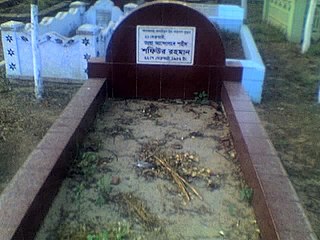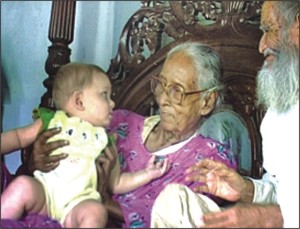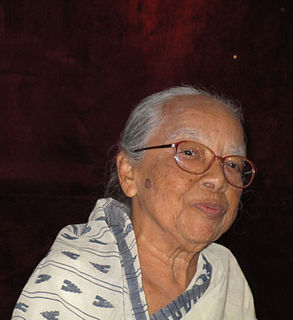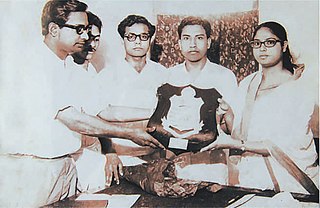Related Research Articles

Dhaka Medical College and Hospital is a public medical college and hospital located in Dhaka, the capital city of Bangladesh. It houses medical school as well as a tertiary care hospital on one campus.

Nilima Ibrahim was a Bangladeshi educationist, littérateur and social worker. She is well known for her scholarship on Bengali literature but even more so for her depiction of raped and tortured women in the 1971 Bangladesh Liberation War in her book Ami Birangana Bolchi. She was awarded Bangla Academy Literary Award in 1969, Begum Rokeya Padak in 1996 and Ekushey Padak in 2000 by the Government of Bangladesh for her contributions to Bangla literature.

Syed Mujtaba Ali was a Bengali author, journalist, travel enthusiast, academic, scholar and linguist. He lived in India, Bangladesh, Germany, Afghanistan and Egypt.

Shafiur Rahman is considered in Bangladesh to be a martyr of the language movement which took place in the former East Pakistan.

Ekushey Padak is the second highest civilian award in Bangladesh, introduced in memory of the martyrs of the Bengali Language Movement of 1952. The award is given to recognize contributions in a number of fields, including culture, education, and economics. The Ministry of Cultural Affairs administers the award.
Abu Naser Muhammad Gaziul Haque was a language activist and an activist leader during the Bengali Language Movement.

Zohra Begum Kazi was the first Bengali Muslim female physician. She was awarded Tamgha-e-Pakistan (1964), Begum Rokeya Padak (2002) and Ekushey Padak (2008).
Muhammad Enamul Haque was a Bangladeshi researcher, litterateur and educationist.
Dilara Zaman is a Bangladeshi film and television actress. She was awarded Ekushey Padak in 1993 and Bangladesh National Film Award for Best Supporting Actress in 2008.
Mumtaz Begum was a Bengali language activist from East Pakistan. She was awarded Ekushey Padak in 2012 by the Government of Bangladesh for her role in language movement.
Husna Banu Khanam was a Bangladeshi educationist, writer and Nazrul singer. She was a pioneer of Bengali Muslim women journalist. In 1999, she received the Ekushey Padak Award for her contribution in music, and in 2004, she received the Begum Rokeya Medal for her contribution to the socio-economic development of women by the Government of Bangladesh.

PratibhaMutsuddi is a Bangladeshi academic and language activist. She participated in the Bengali Language Movement in 1952. She served as the director and principal of Kumudini Welfare Trust, a welfare foundation founded by Ranadaprasad Saha in 1947. She was awarded Ekushey Padak in 2002 by the Government of Bangladesh for her contribution to education.
Muhammad Abdul Hye was a Bengali educationist, litterateur, researcher and linguist. He was awarded Bangla Academy Literary Award in 1961 and Ekushey Padak in 1996 by the Government of Bangladesh.
Mohammad Sharif Husain was a Bangladeshi educationist, philanthropist, and a recipient of the Ekushey Padak.
Halima Khatun was a Bangladeshi activist, writer and academic. She took part in Bengali Language Movement in 1952 along with other activists including Rawshan Ara Bachchu. She was the recipient of Bangla Academy Literary Award in 1981 and Ekushey Padak posthumously in 2019.

Abdul Gafur is a Bangladeshi journalist, teacher, writer and language activist of the Bengali Language Movement that took place in the erstwhile East Pakistan to make Bengali one of the state languages of Pakistan. He was one of the noted members of Tamaddun Majlish, an Islamic cultural organization which played a vital role at the start of the movement.

Ashim Saha is a Bangladeshi poet and novelist. He received Bangla Academy Literary Award in 2011 for his contributions in poetry. In recognition of his contribution to Bengali language and literature, the government of Bangladesh awarded him the country's second highest civilian award Ekushey Padak in 2019.
Ghulam Arieff Tipoo is a Bangladeshi jurist, freedom fighter and language movement activist. He is the Chief Prosecutor of the International Crimes Tribunal, a domestic war crimes tribunal in Bangladesh set up to investigate and prosecute suspects for the genocide committed during the Bangladesh Liberation War.
Mirza Mazharul Islam was a Bangladeshi surgeon and language movement veteran.

Mahfuza Khanam is a Bangladeshi academic and social activist. She is the current president of Asiatic Society of Bangladesh since January 2018. She was awarded Begum Rokeya Padak (2012) and Anannya Top Ten Awards (2013).
References
- ↑ "21 awarded with Ekushey Padak 2019". Dhaka Tribune. 6 February 2019. Retrieved 23 February 2019.
- ↑ "PM hands over Ekushey Padak". The Daily Star. 20 February 2019. Retrieved 23 February 2019.
- 1 2 3 4 মনোয়ারা ইসলামের সংকলন 'অপেক্ষমাণ আমি সময়ের দ্বারে'. Sarabangla.net (in Bengali). 4 January 2019. Retrieved 8 April 2019.
- 1 2 3 4 "We will carry it with us for as long as we are alive". Dhaka Tribune. 21 February 2019. Retrieved 8 April 2019.